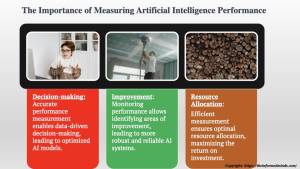Politics
Why is Artificial Intelligence Important? Exploring More Deeply
Published
1 year agoon
By
Drew Simpson
In recent years, artificial intelligence (AI) has become an increasingly integral part of our daily lives, transforming how we live, work, and interact. From chatbots and virtual personal assistants to self-driving cars and smart homes, AI has ushered in a new era of innovation and convenience. But what exactly is AI, and why is it so important? In this article, we’ll delve into the benefits and challenges of AI to help you understand why this technology is such a game-changer.
Understanding Artificial Intelligence
Artificial Intelligence (AI) is a rapidly growing field that has the potential to revolutionize the way we live and work. In this article, we’ll take a closer look at what AI is, its history, and its applications.
Defining Artificial Intelligence
At its core, AI refers to the development of machines that can perform tasks that typically require human-like intelligence, such as learning, problem-solving, and decision-making. These machines are programmed to process data, identify patterns, and make predictions based on that data, allowing them to perform complex tasks autonomously.
AI is a broad field that encompasses a wide range of technologies and applications. Some of the key areas of focus within AI include machine learning, natural language processing, and computer vision.
Machine learning algorithms are used to train machines to recognize patterns in data and make predictions based on that data. These algorithms are used in a wide range of applications, from recommendation engines to fraud detection systems.
Natural language processing (NLP) is another key area of AI. NLP is used to enable machines to understand and interact with human language. This technology is used in virtual assistants like Apple’s Siri and Amazon’s Alexa, as well as chatbots and other conversational interfaces.
Computer vision is another important area of AI. This technology enables machines to “see” and interpret visual information. Computer vision is used in many applications, from self-driving cars to facial recognition systems.
A Brief History of AI Development
The development of AI can be traced back to the mid-20th century when researchers first began exploring the potential of machines that could think like humans. In 1956, a group of researchers organized the Dartmouth Conference, which is widely considered to be the birthplace of AI.
Over the years, AI has evolved from simple rule-based systems to more complex forms like deep learning and neural networks, allowing machines to become increasingly sophisticated and capable of performing a wider range of tasks.
One of the key milestones in the development of AI was the creation of the first expert system in the 1970s. Expert systems were designed to mimic the decision-making processes of human experts in specific domains.
In the 1980s and 1990s, AI research focused on developing machine learning algorithms and neural networks. These technologies enabled machines to learn from data and make predictions based on that data.
Today, AI research is focused on developing even more sophisticated algorithms and technologies, including deep learning, reinforcement learning, and generative adversarial networks.
AI Technologies and Applications
Today, AI is used in various applications, from virtual assistants like Apple’s Siri and Amazon’s Alexa to self-driving cars and intelligent robots used in manufacturing and healthcare.
One of the key applications of AI is in healthcare. AI is being used to develop new drugs, diagnose diseases, and even perform surgery. Machine learning algorithms are used to analyze medical images and identify patterns that can help doctors make more accurate diagnoses.
In manufacturing, AI is being used to improve efficiency and productivity. Intelligent robots are being used to perform tasks that are too dangerous or difficult for humans, while machine learning algorithms are being used to optimize supply chains and reduce waste.
AI is also being used in finance, where machine learning algorithms are being used to analyze financial data and make predictions about market trends. In the retail industry, AI is being used to power recommendation engines and personalize the shopping experience for customers.
Overall, the potential applications of AI are vast and varied. As the technology continues to evolve, we can expect to see even more exciting developments in the years to come.
The Benefits of Artificial Intelligence
Artificial Intelligence (AI) is a rapidly growing field that has the potential to revolutionize the way we live and work. From improving efficiency and productivity to enhancing decision-making and personalization, AI has numerous benefits that can make our lives easier and more fulfilling.
Improved Efficiency and Productivity
One of the key benefits of AI is its ability to automate repetitive or time-consuming tasks, freeing up human workers to focus on more complex and creative work. This can lead to increased productivity and efficiency, as well as cost savings for businesses. For example, AI-powered chatbots can handle customer inquiries and support, freeing up human customer service representatives to focus on more complex issues.
Additionally, AI can help businesses optimize their operations by analyzing data and identifying areas for improvement. For example, AI-powered supply chain management systems can analyze data from suppliers, warehouses, and transportation providers to optimize inventory levels and reduce delivery times.
Enhanced Decision-Making
AI can also help humans make better decisions by processing and analyzing vast amounts of data quickly and accurately. This can be especially useful in fields like healthcare, where AI can be used to diagnose diseases and develop treatment plans based on patient data. AI-powered decision support systems can also help businesses make strategic decisions by analyzing market trends and customer behavior.
Furthermore, AI can help individuals make better decisions in their personal lives. For example, AI-powered financial planning tools can analyze a person’s income, expenses, and financial goals to provide personalized investment advice and retirement planning.
Personalization and Customization
AI can also be used to personalize experiences for individual users, whether it’s through recommendation engines or customized product offerings. This can lead to increased customer satisfaction and loyalty. For example, e-commerce websites can use AI-powered recommendation engines to suggest products that a customer is likely to be interested in based on their past purchases and browsing behavior.
Furthermore, AI can be used to create customized products and services. For example, 3D printing technology combined with AI can create customized prosthetics for individuals with unique needs and specifications.
AI in Healthcare and Medicine
AI has already had a significant impact on the healthcare industry, from improving diagnoses to optimizing treatment plans. Machine learning algorithms can analyze medical images and data to detect diseases and recommend treatments, while virtual assistants can provide patients with personalized medical advice. Additionally, AI can be used to develop new drugs and treatments by analyzing vast amounts of data and identifying potential drug candidates.
AI can also improve healthcare operations by optimizing scheduling and resource allocation. For example, AI-powered systems can analyze patient data and predict which patients are at risk for readmission, allowing healthcare providers to prioritize follow-up care for those patients.
AI in Transportation and Logistics
Self-driving cars and drones are just two examples of how AI is transforming the transportation and logistics industries. These technologies can improve safety, speed up deliveries, and reduce costs. For example, self-driving trucks can operate 24/7, reducing delivery times and increasing efficiency. Additionally, AI-powered logistics systems can optimize delivery routes and reduce transportation costs.
Furthermore, AI can be used to improve traffic management by analyzing data from sensors and cameras to predict traffic patterns and optimize traffic flow.
AI in Education and Learning
AI can also be used to improve education and learning experiences, whether it’s through personalized tutoring or intelligent assessment tools. Teachers and instructors can use AI-powered tools to create more engaging and interactive learning experiences for their students. For example, AI-powered chatbots can answer students’ questions and provide personalized feedback on assignments.
Additionally, AI can be used to identify areas where students are struggling and provide targeted interventions to help them succeed. For example, AI-powered assessment tools can analyze student performance data to identify areas where students need additional support.
In conclusion, AI has numerous benefits that can improve our lives and transform the way we work. From improving efficiency and productivity to enhancing decision-making and personalization, AI has the potential to revolutionize many industries and improve the lives of individuals around the world.
The Challenges of Artificial Intelligence
Ethical Concerns and Bias
One of the biggest challenges of AI is ensuring that it’s used ethically and without bias. AI algorithms can reflect the biases and prejudices of their creators, potentially leading to discrimination or unfairness. It’s essential that we address these issues and establish ethical guidelines for the development and use of AI.
Job Displacement and Workforce Impact
As AI becomes increasingly capable of automating jobs, there is concern that it will lead to significant job displacement and impact the workforce. It’s important that we find ways to mitigate these impacts and ensure that workers are prepared to adapt to the changing job market.
Data Privacy and Security
The use of AI also raises concerns about data privacy and security. As AI systems process large amounts of personal data, there is potential for that data to be misused or stolen. It’s essential that we establish strong security measures and regulations for AI systems to protect user data.
AI Misuse and Malicious Applications
Finally, there is concern that AI could be misused or used for malicious purposes. As AI becomes more sophisticated, it could be used to develop new forms of cyberattacks or even autonomous weapons. It’s essential that we remain vigilant and establish strong regulations to prevent the misuse of this powerful technology.
The Need for Regulation and Governance
As we’ve seen, AI has enormous potential to transform our world for the better. However, as with any technological innovation, it also poses risks and challenges that must be addressed. To ensure that AI is developed and used in a safe, ethical, and effective manner, it’s essential that we establish strong regulations and governance structures. By doing so, we can unlock the full potential of AI while minimizing its risks and challenges.
In conclusion, AI is a powerful and important technology that has the potential to revolutionize the way we live and work. By understanding its benefits and challenges, we can ensure that we use AI in a responsible, ethical, and effective way that benefits all of us.
Featured Image Credit: Pexels; Thank you!
Deanna Ritchie
Managing Editor at ReadWrite
Deanna is the Managing Editor at ReadWrite. Previously she worked as the Editor in Chief for Startup Grind and has over 20+ years of experience in content management and content development.
You may like
-


Google DeepMind wants to define what counts as artificial general intelligence
-


Enabling enterprise growth with data intelligence
-


Everything you need to know about artificial wombs
-


The Download: brain bandwidth, and artificial wombs
-


Best Artificial Intelligence Performance Measurement Solution in 2023
-


Systems of Record are Required for Systems of Intelligence
Politics
Fintech Kennek raises $12.5M seed round to digitize lending
Published
7 months agoon
10/11/2023By
Drew Simpson
London-based fintech startup Kennek has raised $12.5 million in seed funding to expand its lending operating system.
According to an Oct. 10 tech.eu report, the round was led by HV Capital and included participation from Dutch Founders Fund, AlbionVC, FFVC, Plug & Play Ventures, and Syndicate One. Kennek offers software-as-a-service tools to help non-bank lenders streamline their operations using open banking, open finance, and payments.
The platform aims to automate time-consuming manual tasks and consolidate fragmented data to simplify lending. Xavier De Pauw, founder of Kennek said:
“Until kennek, lenders had to devote countless hours to menial operational tasks and deal with jumbled and hard-coded data – which makes every other part of lending a headache. As former lenders ourselves, we lived and breathed these frustrations, and built kennek to make them a thing of the past.”
The company said the latest funding round was oversubscribed and closed quickly despite the challenging fundraising environment. The new capital will be used to expand Kennek’s engineering team and strengthen its market position in the UK while exploring expansion into other European markets. Barbod Namini, Partner at lead investor HV Capital, commented on the investment:
“Kennek has developed an ambitious and genuinely unique proposition which we think can be the foundation of the entire alternative lending space. […] It is a complicated market and a solution that brings together all information and stakeholders onto a single platform is highly compelling for both lenders & the ecosystem as a whole.”
The fintech lending space has grown rapidly in recent years, but many lenders still rely on legacy systems and manual processes that limit efficiency and scalability. Kennek aims to leverage open banking and data integration to provide lenders with a more streamlined, automated lending experience.
The seed funding will allow the London-based startup to continue developing its platform and expanding its team to meet demand from non-bank lenders looking to digitize operations. Kennek’s focus on the UK and Europe also comes amid rising adoption of open banking and open finance in the regions.
Featured Image Credit: Photo from Kennek.io; Thank you!
Radek Zielinski
Radek Zielinski is an experienced technology and financial journalist with a passion for cybersecurity and futurology.
Politics
Fortune 500’s race for generative AI breakthroughs
Published
7 months agoon
10/11/2023By
Drew Simpson
As excitement around generative AI grows, Fortune 500 companies, including Goldman Sachs, are carefully examining the possible applications of this technology. A recent survey of U.S. executives indicated that 60% believe generative AI will substantially impact their businesses in the long term. However, they anticipate a one to two-year timeframe before implementing their initial solutions. This optimism stems from the potential of generative AI to revolutionize various aspects of businesses, from enhancing customer experiences to optimizing internal processes. In the short term, companies will likely focus on pilot projects and experimentation, gradually integrating generative AI into their operations as they witness its positive influence on efficiency and profitability.
Goldman Sachs’ Cautious Approach to Implementing Generative AI
In a recent interview, Goldman Sachs CIO Marco Argenti revealed that the firm has not yet implemented any generative AI use cases. Instead, the company focuses on experimentation and setting high standards before adopting the technology. Argenti recognized the desire for outcomes in areas like developer and operational efficiency but emphasized ensuring precision before putting experimental AI use cases into production.
According to Argenti, striking the right balance between driving innovation and maintaining accuracy is crucial for successfully integrating generative AI within the firm. Goldman Sachs intends to continue exploring this emerging technology’s potential benefits and applications while diligently assessing risks to ensure it meets the company’s stringent quality standards.
One possible application for Goldman Sachs is in software development, where the company has observed a 20-40% productivity increase during its trials. The goal is for 1,000 developers to utilize generative AI tools by year’s end. However, Argenti emphasized that a well-defined expectation of return on investment is necessary before fully integrating generative AI into production.
To achieve this, the company plans to implement a systematic and strategic approach to adopting generative AI, ensuring that it complements and enhances the skills of its developers. Additionally, Goldman Sachs intends to evaluate the long-term impact of generative AI on their software development processes and the overall quality of the applications being developed.
Goldman Sachs’ approach to AI implementation goes beyond merely executing models. The firm has created a platform encompassing technical, legal, and compliance assessments to filter out improper content and keep track of all interactions. This comprehensive system ensures seamless integration of artificial intelligence in operations while adhering to regulatory standards and maintaining client confidentiality. Moreover, the platform continuously improves and adapts its algorithms, allowing Goldman Sachs to stay at the forefront of technology and offer its clients the most efficient and secure services.
Featured Image Credit: Photo by Google DeepMind; Pexels; Thank you!
Deanna Ritchie
Managing Editor at ReadWrite
Deanna is the Managing Editor at ReadWrite. Previously she worked as the Editor in Chief for Startup Grind and has over 20+ years of experience in content management and content development.
Politics
UK seizes web3 opportunity simplifying crypto regulations
Published
7 months agoon
10/10/2023By
Drew Simpson
As Web3 companies increasingly consider leaving the United States due to regulatory ambiguity, the United Kingdom must simplify its cryptocurrency regulations to attract these businesses. The conservative think tank Policy Exchange recently released a report detailing ten suggestions for improving Web3 regulation in the country. Among the recommendations are reducing liability for token holders in decentralized autonomous organizations (DAOs) and encouraging the Financial Conduct Authority (FCA) to adopt alternative Know Your Customer (KYC) methodologies, such as digital identities and blockchain analytics tools. These suggestions aim to position the UK as a hub for Web3 innovation and attract blockchain-based businesses looking for a more conducive regulatory environment.
Streamlining Cryptocurrency Regulations for Innovation
To make it easier for emerging Web3 companies to navigate existing legal frameworks and contribute to the UK’s digital economy growth, the government must streamline cryptocurrency regulations and adopt forward-looking approaches. By making the regulatory landscape clear and straightforward, the UK can create an environment that fosters innovation, growth, and competitiveness in the global fintech industry.
The Policy Exchange report also recommends not weakening self-hosted wallets or treating proof-of-stake (PoS) services as financial services. This approach aims to protect the fundamental principles of decentralization and user autonomy while strongly emphasizing security and regulatory compliance. By doing so, the UK can nurture an environment that encourages innovation and the continued growth of blockchain technology.
Despite recent strict measures by UK authorities, such as His Majesty’s Treasury and the FCA, toward the digital assets sector, the proposed changes in the Policy Exchange report strive to make the UK a more attractive location for Web3 enterprises. By adopting these suggestions, the UK can demonstrate its commitment to fostering innovation in the rapidly evolving blockchain and cryptocurrency industries while ensuring a robust and transparent regulatory environment.
The ongoing uncertainty surrounding cryptocurrency regulations in various countries has prompted Web3 companies to explore alternative jurisdictions with more precise legal frameworks. As the United States grapples with regulatory ambiguity, the United Kingdom can position itself as a hub for Web3 innovation by simplifying and streamlining its cryptocurrency regulations.
Featured Image Credit: Photo by Jonathan Borba; Pexels; Thank you!
Deanna Ritchie
Managing Editor at ReadWrite
Deanna is the Managing Editor at ReadWrite. Previously she worked as the Editor in Chief for Startup Grind and has over 20+ years of experience in content management and content development.
